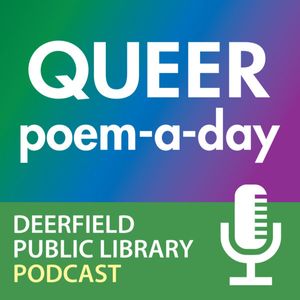 Lisa Hiton (Poetry ’11)’s Queer Poem-a-Day podcast is back for a second season — just in time for the start of Pride Month! Our program administrator, Annaka Saari (Poetry ’21), had the chance to conduct a brief email interview with Lisa to discuss the podcast’s conception, construction, and future.
Lisa Hiton (Poetry ’11)’s Queer Poem-a-Day podcast is back for a second season — just in time for the start of Pride Month! Our program administrator, Annaka Saari (Poetry ’21), had the chance to conduct a brief email interview with Lisa to discuss the podcast’s conception, construction, and future.
Annaka: Where did the idea for the podcast come from, and what’s it been like working with Dylan Zavagno to develop that idea?
Lisa: “Dylan and I went to the same high school in Deerfield, IL. Though Dylan is younger than me, we share a mentor — our AP Senior English teacher, the inimitable Jeff Berger-White. Dylan was interviewing Dan Chiasson for the Deerfield Public Library Podcast. When he mentioned it to Jeff, Jeff put us in touch as I knew Dan from my years living and writing in Boston. During my first talk with Dylan, I made a remark about how I wished someone would let me run a ‘gay a day’ poetry series. In the absence of Pride festivities and activism during the pandemic, I just wanted to have some kind of digital and literary parade of voices. I mentioned that during the pandemic, my days were filled with long walks and lines of beloved poems flooding my mind to coddle my lonesome. Poetry has unique powers in the inner life of readers. I mentioned these things in passing as a means to get to know Dylan and share some of our common threads.
About a week later, Dylan emailed me to set up another Zoom meeting. I assumed it was to ask more questions about the works and life of Dan Chiasson. Instead, Dylan informed me that he pitched my idea, Queer Poem-a-Day, to the Library and they accepted. We have been co-producers and dear friends ever since.
As the program developed, one of my personal bents was to lean into a unique law in Illinois — the first of its kind — that requires LGBTQIA+ inclusion in K-12 schools. The voices, the books of the poets we acquire, and the poems we archive online are a growing contribution of LGBTQIA+ people in our contemporary moment. As time passes, I hope that many communities in Illinois public schools and beyond will use this program, the books, and the poems in inspiring and transformative ways. Dylan and I touch on this in our PEN America interview, WBEZ Chicago interview, and this year’s intro episode — about how public art stands to reckon with some of these anti-trans and anti-LGBTQIA laws.”
A: How do you go about curating the list of readers and poems for the series? Last season, you had some brilliant writers reading their work — Andrea Cohen, Carl Phillips, Kazim Ali, and Chen Chen immediately spring to mind — and I’d love to hear more about how you put that list together.
L: “In all honesty, I simply reach out to poets whose work Dylan and I love. I have some connections to writers who have published or submitted to The Adroit Journal where I am Poetry Editor — I think that recognition helps when I reach out to writers who might not know who I am. I also think about who has books coming out, or recent books, as the library acquires books or chapbooks by each of our poets. I also aim for a range of representation — queer voices have all kinds of different predicaments, poetics, bodies, generations, aesthetics, etc. I hope each year we keep expanding that definition of queer voice with this vast array of poems.”
A: What do you hope to see in the future of the podcast?
L: “As listeners will see and hear this year, things are changing. Rebellion is necessarily in the air. Dylan and I never request poems — the choice is entirely up to the poet. And so, when the work comes in, the common threads and themes begin braiding themselves together. Our poet’s pianist, Daniel Baer, chose Karol Szymanowski’s Schéhérazade as this year’s music — a much eerier and moodier piece than last year’s Samuel Barber. The poets, too, seem to be selecting work that is much more invested in the body-politic of politics than last year. It makes sense given the current climate of book bans and anti-trans and anti-LGBTQIA+ bills popping up everywhere (about 272 total across at least 38 states). None of this was part of the prompt or the assignment, but it is showing us listeners how vital poems are in our contemporaneity. Poem’s might not change laws, but they could stand to change our rhetoric, or even shift the paradigm of how people see queerness in the space of public art and beyond.
In a pragmatic way, I hope the podcast continues to be supported by public institutions. I hope that educators see the podcast as an asset that can be used in so many ways in their classrooms (and not just traditional English classrooms — I’m thinking: new media, history, social studies, art, professional development, DEI, etc.). I hope that patrons will keep checking out and reading these incredible books.
Mostly, though, I hope it keeps going at all. That we have public funding means so much in a time when there’s so little support in most other ways for queer lives. And I hope the poems keep making their own music in the ears of our listeners and in the broader scheme of our culture.”
Listeners can find daily episodes of Queer Poem-a-Day on Spotify, Apple Podcasts, Google Podcasts, and Stitcher Radio throughout the month of June. Those who wish to access the Queer Poem-a-Day archive can do so at the Deerfield Public Library website.
